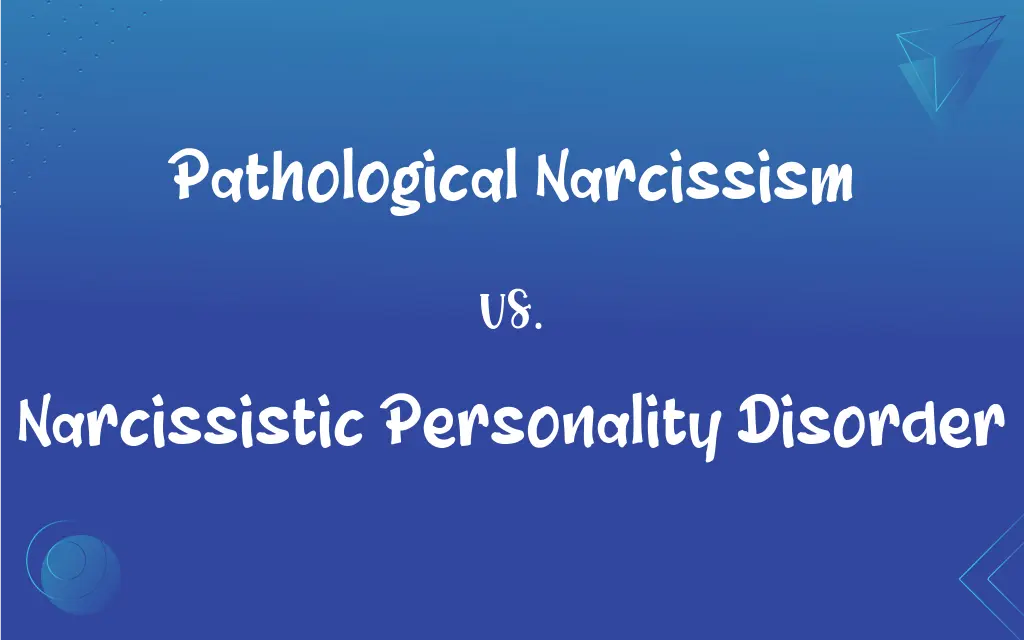Pathological Narcissism vs. Narcissistic Personality Disorder: What's the Difference?
Edited by Aimie Carlson || By Janet White || Published on April 26, 2024
Pathological narcissism is a broader term for extreme self-centeredness. Narcissistic Personality Disorder (NPD) is a specific, diagnosable mental disorder characterized by persistent patterns of grandiosity, need for admiration, and lack of empathy.

Key Differences
Pathological narcissism is a broader term describing extreme narcissistic traits, including grandiosity and self-centeredness. Narcissistic Personality Disorder (NPD) is a specific mental health diagnosis characterized by persistent patterns of grandiosity, fantasy, and a lack of empathy.
Pathological narcissism refers to a range of narcissistic behaviors, while NPD is a diagnosable condition in the Diagnostic and Statistical Manual of Mental Disorders (DSM-5). NPD involves a consistent pattern of behavior that impacts various aspects of life.
Pathological narcissism can manifest in various degrees and forms, not all of which qualify for an NPD diagnosis. NPD, on the other hand, follows specific criteria, including an inflated sense of self-importance, need for excessive admiration, and a lack of empathy.
Treatment for pathological narcissism varies based on the severity and impact on daily life, and might not always involve medical intervention. NPD typically requires a more structured treatment plan, often involving therapy and sometimes medication.
Both pathological narcissism and NPD can negatively impact relationships and social functioning, but NPD, due to its persistent and pervasive nature, tends to have a more detrimental effect on personal and professional relationships.
ADVERTISEMENT
Comparison Chart
Definition
Extreme narcissistic traits including grandiosity
Diagnosable mental disorder with specific criteria
Clinical Recognition
Broad term, not a formal diagnosis
Recognized as a mental disorder in DSM-5
Behavioral Characteristics
Varies in degree and form
Consistent pattern of grandiosity, fantasy, lack of empathy
Treatment Approach
Depends on severity; not always medical
Structured treatment, often therapy and medication
Impact on Life
Can vary; not always pervasive
Long-term, pervasive impact on personal and professional life
ADVERTISEMENT
Pathological Narcissism and Narcissistic Personality Disorder Definitions
Pathological Narcissism
Persistent grandiosity and need for admiration, beyond typical narcissism.
Pathological narcissism drove her to constantly seek validation and attention.
Narcissistic Personality Disorder
Includes a need for excessive admiration and a lack of empathy for others.
Her narcissistic personality disorder manifested in her inability to care for others' feelings.
Pathological Narcissism
A severe form of narcissism impairing social and personal functioning.
His pathological narcissism affected his relationships and work life.
Narcissistic Personality Disorder
Can lead to significant challenges in personal and professional relationships.
Her narcissistic personality disorder strained many of her personal relationships.
Pathological Narcissism
An extreme narcissistic condition impacting empathy and interpersonal relations.
Pathological narcissism made him oblivious to the needs and feelings of others.
Narcissistic Personality Disorder
Recognized in the DSM-5 with specific diagnostic criteria.
His therapist diagnosed him with narcissistic personality disorder following the DSM-5 criteria.
Pathological Narcissism
Includes a spectrum of narcissistic behaviors, not limited to a diagnosis.
Despite her pathological narcissism, she didn't meet the criteria for NPD.
Narcissistic Personality Disorder
A mental disorder characterized by an inflated sense of self-importance.
He was diagnosed with narcissistic personality disorder due to his excessive ego.
Pathological Narcissism
Extreme narcissism characterized by excessive self-focus and self-importance.
His pathological narcissism made it difficult for him to empathize with others.
Narcissistic Personality Disorder
Often requires psychological intervention and therapy for treatment.
Treatment for his narcissistic personality disorder involved long-term therapy.
FAQs
What is pathological narcissism?
It's an extreme form of narcissism with persistent grandiosity and self-focus.
Can someone with pathological narcissism not have NPD?
Yes, not all cases of pathological narcissism meet the criteria for NPD.
How is NPD diagnosed?
Through a clinical assessment based on DSM-5 criteria.
What are common traits of NPD?
Exaggerated self-importance, need for admiration, and lack of empathy.
Is NPD common?
It's relatively uncommon as a formal diagnosis.
Is pathological narcissism a mental illness?
It's a term describing extreme narcissistic traits, not a formal diagnosis.
Can people with NPD have successful relationships?
It's challenging, but not impossible with treatment and self-awareness.
How is NPD treated?
Typically with psychotherapy and sometimes medication.
Can pathological narcissism be mild?
It varies in degree and can range from mild to severe.
What causes pathological narcissism?
It can arise from a combination of genetic, psychological, and environmental factors.
Is there a cure for pathological narcissism?
There's no cure, but therapy can help manage symptoms.
Are NPD symptoms constant?
They are persistent and pervasive, impacting various life aspects.
Can children show signs of pathological narcissism?
Yes, though it's cautiously approached since personalities are still developing.
How long does treatment for NPD take?
It varies, often requiring long-term therapy.
Can lifestyle changes help with NPD?
They can support treatment, especially with stress management and social skills.
Can stress trigger pathological narcissism?
Stress doesn't trigger it, but it can exacerbate existing narcissistic traits.
Does NPD get worse with age?
Symptoms can change over time, sometimes intensifying or improving.
Does pathological narcissism affect work life?
Yes, it can negatively impact professional relationships and performance.
Are males more likely to have NPD?
It's more commonly diagnosed in males, but it can affect anyone.
Is self-esteem linked to pathological narcissism?
Despite seeming high, self-esteem is often fragile in narcissistic individuals.
About Author
Written by
Janet WhiteJanet White has been an esteemed writer and blogger for Difference Wiki. Holding a Master's degree in Science and Medical Journalism from the prestigious Boston University, she has consistently demonstrated her expertise and passion for her field. When she's not immersed in her work, Janet relishes her time exercising, delving into a good book, and cherishing moments with friends and family.
Edited by
Aimie CarlsonAimie Carlson, holding a master's degree in English literature, is a fervent English language enthusiast. She lends her writing talents to Difference Wiki, a prominent website that specializes in comparisons, offering readers insightful analyses that both captivate and inform.































































